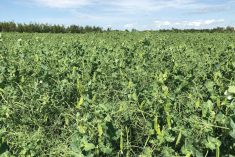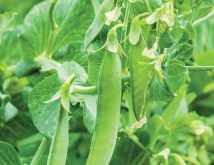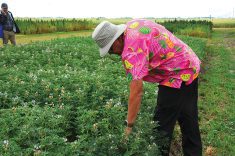Manitoba farmers don’t grow many field peas anymore, but that could change when the world’s biggest pea-processing plant, being built here by French-based Roquette, starts operating in April 2019.
Pascal Leroy, Roquette’s vice-president for pea and new protein business line, and Premier Brian Pallister, broke ground Sept. 28 for the $400-million facility, in what had been a farmer’s field a few miles west of the City of Portage la Prairie.
- Read more: Pea protein under the microscope ahead of Roquette plant
- Read more: Comment: Give peas a chance
Read Also

VIDEO: Timing a fungicide for mycosphaerella blight in peas
Knowing what kind of blight is in your pea field — before firing up the sprayer — can help you avoid an expensive mistake, as just one of the two common blights affecting peas can be treated with a fungicide.
There were also hints Roquette, which operates in 80 countries processing corn, wheat, potatoes and peas, is considering processing other Manitoba crops.
The plant will extract protein from peas and use it in a range of foods from pasta and bread to sport bars and soups.
It is a “big day” for the local people and the province, Pallister said.
“We are very proud today and thankful today and I feel blessed today,” he said. “As someone who grew up about eight miles away from here, whose 4-H leader was from a mile and a half away, whose curling friends farm just over there and who has a tremendous affection for this part of the world, I have to say again, thank you, merci and all the best in the future.”
The plant, which will employ 350 people during construction and 150 people when operating, will need 120,000 tonnes of peas a year. Although in 2016 Manitoba produced almost 154,000 tonnes of peas, based on crop insurance data, the five-year average is just under 80,000 tonnes.
However, Canada is the world’s largest pea producer and Leroy told reporters Roquette will also buy peas from neighbouring provinces. Saskatchewan, for example, routinely produces two million tonnes a year.
That’s probably why Saskatchewan reportedly was surprised and disappointed when Roquette announced in January plans to build in Manitoba.
There are many factors to consider, including “access to future growth,” Leroy said, when asked why Roquette picked Manitoba.
“Being in Manitoba was a way to access well-educated people, as well as to access green electricity, sustainable, which is quite important… and as well to be close to this very nice product, which is the yellow pea…” he said.
“As you know, your country has very nice logistic setups. Access to the U.S. is quite easy. This was really a tremendous asset to come and build a plant here in Portage la Prairie.”
The Portage plant will service North America and offshore markets too, Leroy said.
Pea protein demand is high because it’s not genetically modified, it’s a non-allergen and it’s gluten free, he added.
The demand for protein is projected to double in the next 30 years to 900 million tonnes, Leroy said.
“We expect plant protein to be a big part of that, and especially pea protein, which is growing at roughly 15 per cent a year,” he said.
Having access to a pea plant close by will give Manitoba farmers an opportunity to grow higher-priced crops, Manitoba Agriculture Minister Ralph Eichler told reporters.
“Farmers are very resilient,” he said. “They will grow where they have a market.”
The government will also help farmers find the right pea varieties for Manitoba conditions.
“That is really what government’s role is — to assist in order to make sure we get those products that are going to help them meet their demands,” he said.
“We’ve got to get some (pea) crop in the ground this coming spring in order to ensure they (Roquette) have enough product to get them started,” Eichler said.
“They’ve had some boots on the ground talking to farmers in order to get some contracts ready for next year.”
Manitoba farmers will likely grow more peas because of the Roquette plant, Manitoba Pulse & Soybean Growers executive director Francois Labelle, said in an interview Sept. 29. As pea production declined in Manitoba, so did the number of local buyers, he said.
Labelle said one former pea grower told him “peas are good for my farm, they’re good for my land… and I want to grow them.”
“When you have a local market for something, people get interested,” Labelle added.
There could be other Manitoba value-added opportunities with Roquette, Eichler said.
“They are definitely looking at other crops,” Labelle said. “When they first announced the plant at Portage they definitely said this is Phase 1. We’re hopeful and optimistic that they are going to continue building in that facility. That’s why they bought extra land.”
Pallister also hinted at further opportunities.
“I know the (Roquette) family is very entrepreneurial and we encourage them to look at other opportunities to add, expand and grow and move forward here in Manitoba,” he said.




















